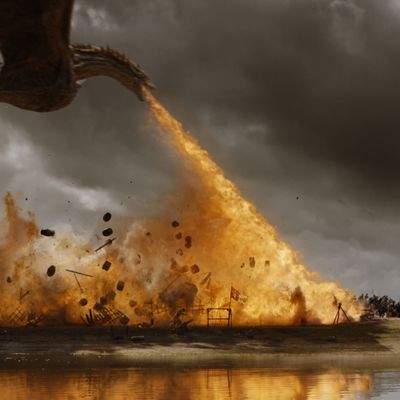
Even when Game of Thrones can do nothing else right, it knows how to do spectacle. Character motivations might be murky, travel times might not always make sense, and you occasionally get the sense that everything is happening because the writers need it to happen, but at its best, the show can paint on an epic scale like nothing else on television. GOT has already given us giants riding mammoths, claustrophobic hand-to-hand combat, and an explosive naval battle, but the closing sequence from Sunday night’s episode may have just set a new high-water mark, as Daenerys took to the sky to burn the Lannister army on its way back from Highgarden. The battle — which lacks a classic moniker like “Battle of the Bastards,” though HBO seems to be calling it the “Loot Train Attack” — took up the last quarter of the episode, gave Westeros its first glimpse of dragon combat in 150 years, and set a record for the number of stunt performers set on fire. The scene was awesome in the Terry Pratchett sense: It provoked genuine awe.
But it’s not just in the scale. The show has given us plenty of big scenes that came and went — recall Daenerys burning the slavers’ fleet last season, or Euron Greyjoy’s surprise attack a few episodes back. What made this sequence stand out is that, for the first time since Blackwater, this was a Game of Thrones battle without a clear rooting interest. Previous set pieces gave us relatively easy choices: Jon and Sansa versus Ramsay Snow, or Theon and Yara versus crazy uncle Euron. Here, though, our allegiances were split. In the big picture, we’re rooting for Daenerys to overthrow Cersei, but “The Spoils of War” pitted Dany against the most sympathetic members of the royal administration: Jaime, the only member of Cersei’s inner circle with a conscience; Bronn, a fan favorite and audience surrogate; and Dickon Tarly, who got a few quiet moments to show that even though he’s his terrible father’s favorite son, he’s not a complete, well, you know. The rest of the Lannister army were faceless goons, but we’d only recently been reminded that many of them are good-hearted lads who just want to go home and watch the sunset over a castle on a hill.
Conversely, Daenerys is one of the closest things GOT has to an out-and-out good guy, and she certainly gets a hero’s entrance. When she swoops into battle above the charging Dothraki, it’s hard not to cheer for her. But it’s harder to do so after seeing the destruction Drogon leaves in his wake: charred corpses turning to dust, terrified horses trying to escape the flames, maimed soldiers struggling to make it into Blackwater Rush. Remember, too, that the wagons Dany burned weren’t filled with weapons or even gold, but grain. Good luck defending that decision to the starving smallfolk of King’s Landing.
If there’s any hint to where our sympathies are supposed to lie, consider the scene’s centerpiece, a one-take shot as brutal as anything we’ve seen on the show. We follow Bronn, who’s been unhorsed in particularly cutting fashion, as he stumbles through the battle looking for Qyburn’s scorpion. The world around him is fire and blood, just as the Targaryen house words promise. It’s remarkably similar to Dunkirk, which followed terrified heroes just trying to survive airborne destruction — except this is still a fantasy series, which means that here, the heroes can fight back. Tell me: When Bronn shot that bolt at Drogon, did you hope he hit or that he missed?
All season, Daenerys has struggled with the question of how best to use her dragons. Part of her clearly wants to head straight to the Red Keep and burn it all down; with each setback, her patience with her advisers’ more cautious plans has grown thin. Though Sunday night’s battle was a major victory for Team Dany, it also contains the seed at the center of her conflict this season: Does she want to rule the Seven Kingdoms, or just conquer them?


